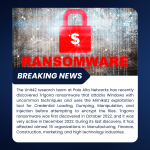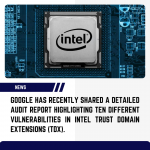The UCS devices are used in Illumina's DNA sequencing systems to copy genetic material before it is sequenced. The devices are used by researchers and healthcare providers around the world to analyze genomes and identify potential genetic causes of disease.
According to Illumina, the vulnerabilities were discovered during routine testing, and the company immediately launched an investigation. The investigation found that the vulnerabilities could potentially allow unauthorized access to the UCS devices, potentially leading to the theft of sensitive genetic data.
In response to the discovery, Illumina has issued a security advisory to its customers, urging them to take immediate action to mitigate the risk. The company has also released a software patch to address the vulnerabilities.
Illumina has not disclosed exactly how many UCS devices are affected by the vulnerabilities or how long they have been present. However, the company has stressed that it has no evidence of any unauthorized access to genetic data as a result of the vulnerabilities.
The discovery of the vulnerabilities in Illumina's UCS devices highlights the growing importance of cybersecurity in the healthcare industry, particularly as more and more sensitive patient data is being stored and analyzed digitally.
According to a recent report by the cybersecurity firm CynergisTek, healthcare data breaches increased by 55.1% in 2020, with the majority of the breaches caused by hacking or other IT incidents. The report also found that the average cost of a healthcare data breach was $7.13 million, making cybersecurity a significant financial concern for healthcare providers.
In response to these growing concerns, the US Department of Health and Human Services has released new guidance on cybersecurity best practices for healthcare providers, including recommendations for conducting risk assessments and implementing multi-factor authentication.
Illumina's discovery of critical vulnerabilities in its UCS devices underscores the need for healthcare providers to remain vigilant and proactive in their efforts to protect patient data.
In a statement, Illumina CEO Francis deSouza said, "At Illumina, we take the security of our customer's data very seriously. We are committed to working closely with our customers to ensure that they have the information and support they need to protect their data and their patients."
The discovery of the vulnerabilities in Illumina's UCS devices is also a reminder of the broader importance of cybersecurity in the biotech industry. As biotech companies increasingly rely on digital systems to store and analyze genetic data, they must take steps to ensure that these systems are secure and protected from potential cyber threats.
In recent years, there have been several high-profile cyber attacks on biotech companies, including the 2019 ransomware attack on the DNA sequencing company NGS, which resulted in the theft of over 10 terabytes of sensitive data.
As the biotech industry continues to grow and evolve, it will be critical for companies to prioritize cybersecurity and take proactive measures to protect their digital assets.
In the case of Illumina, the company's swift response to the discovery of the vulnerabilities in its UCS devices is a positive sign that the biotech industry is taking these issues seriously and working to address them.
Overall, the discovery of critical vulnerabilities in Illumina's UCS devices is a timely reminder of the importance of cybersecurity in the healthcare and biotech industries. As these industries continue to rely on digital systems to store and analyze sensitive data, it will be critical for companies to prioritize cybersecurity and take proactive steps to protect their assets and their customers.








